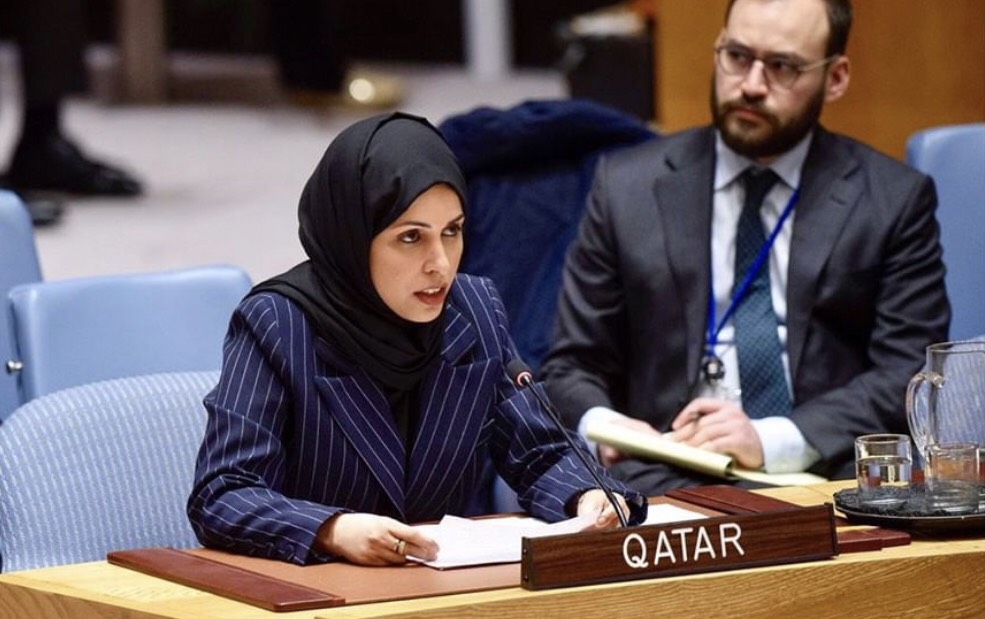Qatar Presides over Session of UN General Assembly Condemning Terrorist Attack on Mosques in New Zealand

New York - Information Office - April 02
HE Permanent Representative of the State of Qatar to the United Nations Sheikha Alya Ahmed bin Saif Al-Thani, as Vice-Chairperson of the 73rd session of the UN General Assembly, chaired on Tuesday a session to condemn the terrorist attack on the mosques in Christchurch, New Zealand, and other acts of violence based on religion or belief.
The General Assembly unanimously adopted a resolution condemning terrorism and other acts of violence based on religion or belief.
The State of Qatar was at the forefront of countries that called for a General Assembly meeting following the terrorist attack on mosques in Christchurch.
The meeting stressed the sanctity of places of worship and the need to reject Islamophobia and other forms of hatred and intolerance.
The meeting also condemned the attempts to insult Islam and Muslims, stressing the need to combat inflammatory rhetoric whatever its source, especially from governmental and official bodies for political purposes, because of their threats to international peace and security.
The meeting, chaired by HE Sheikha Alya Ahmed bin Saif Al-Thani, witnessed the adoption of a resolution that the State of Qatar contributed to drafting and presenting in partnership with the Republic of Turkey, the State of Kuwait and other countries. HE Minister for Foreign Affairs of Turkey Mevlut Cavusoglu introduced the draft resolution before the vote.
The General Assembly strongly condemned the terrorist attack, which it described as "ugly and despicable," which targeted Muslim worshipers in Christchurch, New Zealand, on March 15. Also, it strongly condemned the ongoing violence and acts of terrorism targeting persons, including members of religious minorities, on the basis of religion or belief or on its behalf.
In its resolution, the General Assembly urged all States to work together to protect individuals from acts of violence, discrimination, and hatred based on racism, racial discrimination, xenophobia, and related intolerance. In addition, it urged States to protect and promote freedom of religion and belief and to promote a domestic environment of religious tolerance, peace, and respect by combating incitement to religious hatred and violence as well as planning and coordinating actions at the local, national and regional levels through education and awareness-raising.
Finally, in its resolution, the General Assembly called for intensified international efforts to promote a global dialogue on the promotion of a culture of tolerance and peace at all levels, based on respect for human rights and the diversity of religions and beliefs.
HE Minister for Foreign Affairs of Turkey Mevlut Cavusoglu, HE Kuwait's Deputy Prime Minister and Minister of Foreign Affairs Sheikh Sabah Khalid Al Hamad Al-Sabah, and HE Minister for Foreign Affairs of the Republic of Indonesia Retno Lestari Priansari Marsudi participated in the session.
Jassim Sayyar Al-Maawda, Deputy Permanent Representative of the State of Qatar to the United Nations, stated that the resolution submitted to the General Assembly condemns in the strongest terms the attacks against worshipers in the two mosques in Christchurch and urges the adoption of practical measures to protect innocent people from such acts of terrorism.
In his statement to the General Assembly, the Deputy Permanent Representative said that the State of Qatar reiterated its condemnation of all acts of terrorism, including those motivated by religious hatred.
"We have learned from the terrorist attack in Christchurch and other terrorist attacks the gravity of inflammatory discourse and attempts to demonize those affiliated with religion, race, nationality or minority, including attempts to abuse Islam and Muslims'. He stressed the need to stand firm against inflammatory rhetoric whatever the source, especially the addresses issued by government agencies and official for political purposes, as they threat peace and security in our region and the world at large.
The statement reiterated the State of Qatar's assertion that terrorism has no religion, no ethnic or national identity, and that the State of Qatar recognizes the seriousness of stereotyping with regard to terrorism and violent extremism.
The danger lay in the stigmatization of people or followers of a particular religion simply because a member had committed a brutal crime against humanity.
"This is an unfair violation of the rights of millions of people, where religious and ethnic discrimination is practiced, leading to a climate of intolerance and hatred of the other, which in turn leads to catastrophic consequences and additional crimes and the sustainability and expansion of the cycle of violence," he said.
The statement also warned against the accusation of an entire religion or an entire nation of terrorism, which would distort the real efforts to study this phenomenon and find out the real reasons of it.
The Deputy Permanent Representative of the State of Qatar to the United Nations said that "the important decision that has been adopted must be the basis for continuous efforts that can be built on to prevent acts of terrorism motivated by religious hatred in places of worship."
The statement welcomed of the Secretary-General of the United Nations' call for the Alliance of Civilizations, to communicate with governments, religious organizations, religious leaders and others to discuss measures to prevent attacks against religious sites and to ensure their sanctity.

